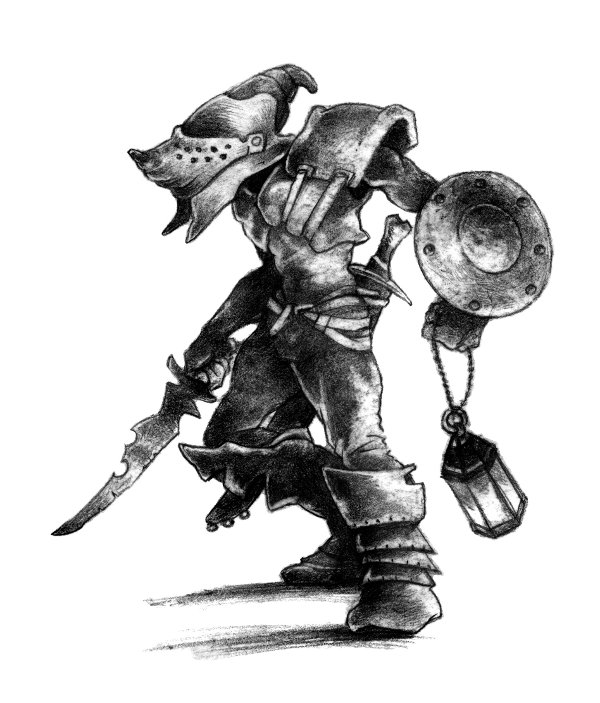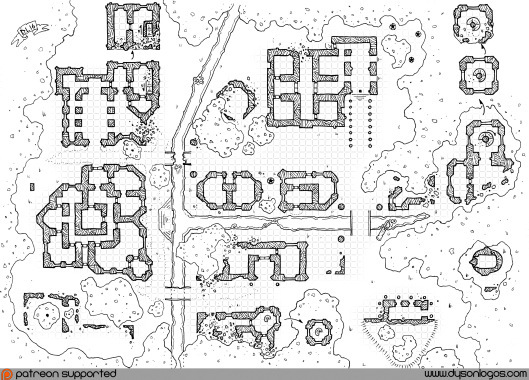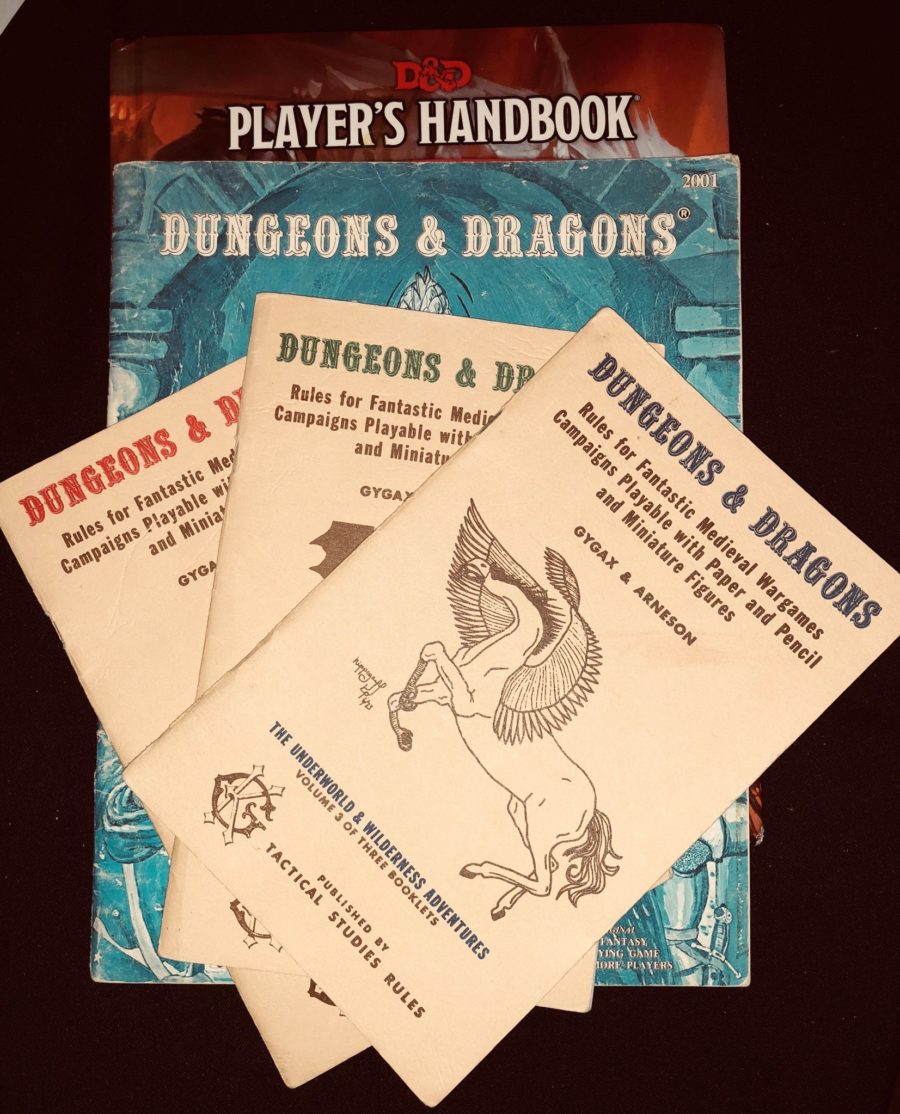Between 10-15 years ago, not long after the advent of the first Open Gaming License from Wizards of the Coast, there was a formulation and publishing of various clones of the original Dungeons and Dragon rules. At the time, it was needed for two basic reasons: 1) The original rules had long been out of print and it was getting harder and harder to find at an economical cost, especially outside the main markets for the games when they were first released. 2) The OGL allowed you to publish and sell adventures without any worries that WoTC would take legal action against you to protect their intellectual property, including their copyrights.
There are a lot of philosophical reasons why the OSR became more visible and prolific as like-minded people were much more able to share a common core of ideas over the internet, in particular in forums. At the time, there were a lot of people that felt that the 3rd edition of D&D was suffering from rules bloat and there were too many rules that took the game play from interactive story telling moderated by the dungeon master to roll playing where the players just made a die roll as indicated by a skill or other written rule. The game emphasis also shifted from gaining loot to killing monsters as the base way to earn experience points moved from 1 gold piece = 1 experience point to all of the experience points earned coming from the results of combat.
If you wander through the old forums, some only available via internet archive sites, you will find very little resistance to the new rules themselves. The original rules were such a bare framework that anyone who had been running a game for a long time had invented and used house rules to cover common occurrences in their games or to ensure the right type of characters so that they could run the type of game they wanted to. There were a few people that really preferred the old THAC0 or even older systems of looking it up on tables, but ascending AC with a target number to hit was quite popular.

The combination of the practical reasons to want to publish OSR rules and a few motivated people empowered by desktop publishing resulted in quite a few game systems being published, all of which took their own path in tweaking the original rules to suit the different developers that worked on the rules. Some were thought experiments of how to use the now OGL 3rd edition rules and back cast to recreate the older rule sets and the ability to cheaply publish and advertise over the internet meant that their experiment traveled broadly and mutated into new versions. I do find it ironic that for all the discussion on too many rules, pretty much every OSR ruleset introduces some new form of “house rules” to the OSR ruleset. Even today, there are many OSR style products that are completely the introduction of new rules as the product takes D&D to space or WWII or whatever new setting imagined by the author. Somewhere buried deep is the old framework, but all you can see is the new rules on spacecraft and the reviews laud the new rules as well.
I find it ironic that the fear that the older rules were rare and expensive are basically gone today. You can go to the DMs Guild website and purchase PDF of the original rules, and there were reprints of the AD&D rules made pretty recently as well and they can still be found on amazon.com. So if the reason for the creation of the new rulebooks was to make sure the old rules were available at a reasonable price, that no longer applies:
Want a printed version of the Basic D&D rules? (Labyrinth Lords)
How about the AD&D rulebooks? (OSRIC and S&W Complete)
Not old school enough, want the original books (PDF only for now but all three of the original books plus the reference sheets)? (S&W White Box)
I don’t think you even need to go to the effort of buying the older rules if you want to play an OSR-style game, the current 5e rules are quite capable of OSR play and they have the advantage of also having all the modern modules and materials available as well.
Here is the basis I used for what an OSR game is, Matt Finch’s A Quick Primer for Old School Gaming:
https://www.froggodgames.com/quick-primer-old-school-gaming
In the primer, there are 4 “Zen moments” that Matt says are the essence of OSR:
- Rulings, not rules
- Player skill, not character abilities
- Heroic, not super-heroic
- Forget game balance
5e handles these “Zen moments” quite well. I will attempt to describe how, but before I do, here is the absolute first thing you need to change – where experience points (XP) come from. The base rule in 5e says that XP comes from killing monsters. If you want a game where combat is less important, you need to reward the players for something other than killing monsters. Otherwise, they will kill monsters as their main activity as that is the only way they will be able to increase in level. The two choices are either milestone advancement (give XP or levels based on how they progress within the story) or gold = XP. You will need to come up with your own house rule on gold = XP as it is not in any of the published rules. If you need a quick and dirty one, most of the modern adventures work fine with dividing the monster XP in the rules by 10 and granting 1 XP per GP. If you make your own adventures you will have even more control over that.

I also want to be clear that Matt wrote the document at the very dawn of the publication of 4e D&D. At that time, there had been years of both WoTC and 3rd party publishers releasing book after book that added more and more and more rules for 3e games and there was a general feeling that too many new rules had been created.
Ruling, not rules
5e has tremendously pared back the skill lists compared to other editions (18, not including tools and proficiencies) and feats are optional, so should not be considered to be standard. The advice in the new DM’s Guide to decide if a player action succeeds is not that different than what Matt presents as OSR style playing and the basic rule in 5e is remarkably similar to the same house rule that most DMs have been using for decades which is if it is not an automatic success, pick a number and roll against it (or under ability scores which also was super common).
5e also has a catch-all rule that is much better than any OSR rule I can remember – advantage/disadvantage. So if you decide there needs to be a random check, and the character has done something that should be good but does not make the success automatic, then they get advantage.
If your players say that they are doing something that should result in something happening, just make it happen. There is “the rule of cool” that popular streamers do all the time. They focus on making the game fun and on the story, not the dice rolls (dice rolling is boring to watch). Most streamers are using 5e D&D, there is no reason why you cannot do the same.
“But, but, there are a lot of rules. How can you just ignore them?”, you may say. I am not ignoring the rules. 5e is remarkably streamed down and straightforward in many ways compared to even the original rules once you add in all the supplements. The secret is not to hunt for a rule, it is to make a ruling within the framework of the existing rules.
In the example of jumping off a ledge, 5e does not have specific rules for that. Just make a ruling on the fly. I would say, critical on a 19 or 20 for the drop adding damage and surprise and an Acrobatics roll with a DC 10 to land balanced and on your feet. Simple, lets them do something out of the box and I have made a ruling that works within the rules and we can move on to the next person in initiative order.
I would also note that the theory that there were not a lot of rules in the original D&D is not well supported, especially if you consider that Chainmail was officially considered to be the combat system to be used. The original rules even had details on how to run naval and air combat, including writing down expected actions in advance and revealing them as is common in wargames. There were rules on castles and running estates. Rules on specialists and how to hire them. Rules on henchmen with the expectation that you would enter the dungeon with hirelings and henchmen in tow. There was a solid framework to use, what is missing from the original rules and modern rules is all the details and explanations that fill out the framework. The DM was expected to do that.
Player skill, not character abilities
This is an area where I disagree with Matt. D&D has always been an RPG, and even from the very first booklet, there were attributes for each character and the base classes had abilities and rules. Rolling for abilities was mainly done for combat and spell casting, but character abilities were constantly used in the original games. What there was not at the time was a large set of rules for skills, other than thieves and detecting secret doors (elves), sloping passages (dwarves) and opening doors/bend bars/lift gates.
I think that the “player skill” over “character abilities” theory comes from the early tournament culture of D&D and AD&D. Chainmail evolved from miniatures war games rules and the early D&D players all had strong roots in wargaming culture. That lead to games being run in tournament format and tournaments are quite different than a regular weekly game as you have limited time to run them and you need victory conditions. You ran modules like Tomb of Horrors and counted survivors and how far you got into the dungeon. Or you added riddles into the game that players had to solve, and the riddles may not have even related to the game setting at all (I made the finals of the one GenCon I went to in 1983 or 1984 and we missed an important riddle as we were mainly Canadians in the group and the riddle assumed you know what a military Bronze medal was).
My issue with that is that I think it is poor roleplaying and poor playing in general as I think that the characters should have a personality and a hook into the setting and not just be the players. That means that your characters should have access to the knowledge and training they have for who they are. Even the earliest editions allowed checking against ability scores, and 5e has significantly dialed back the skill list and added the already discussed advantage mechanic plus bounded accuracy.
Now, in Matt’s defense, he does say his examples are exaggerations, but if you want an OSR style game but use 5e, don’t be a lazy DM and do not allow your players to be lazy. If moving a moose head reveals a secret passage, allow automatic success if the players say they try it. Don’t allow Investigation or Perception rolls to give the answer, give hints out instead. If there is a trap and your thief checks the area for traps, ask them how they are checking and where. If they are not specific enough to find the trap or you want it to be a little harder to find, use the Perception roll to see if they notice anything off. Don’t tell them they found a trap, give them a good hint that something is off. Maybe they see scuffs on the floor or a thin tread wrapped around a hinge, or something similar. Play it up as much as you can without telling them directly and see what they do. Use the skills as a guide, not a requirement and both you and your players will enjoy it plus you will draw them into the adventure a lot more.
One of the issues with the newer modules is that they have blocks of text meant to be read out. Older modules tended to describe the room in a general was, but “chat boxes” meant to be read out loud by the game master are newer. I like them, but they also encourage not only a little bit too much laziness, they also set off too many alarms when suddenly you start giving away hints because of successful Perception rolls. Before, the DM would always be making things up, little details when describing the room because nothing was really being spoon fed to them (us, I can get just as lazy). If you’re not quite sure what to describe of say for extra detail, I can suggest an old standard – a table to roll on. In this case, a “dungeon dressing” table.
And here are a few free examples to try out:
http://www.ragingswan.com/10-things-to-say-when-a-pc-makes-a-perception-check-and-finds-nothing/
http://www.ragingswan.com/10-suspiciously-detailed-dungeon-double-doors/
The Raging Swan website has a lot of free example tables, and a little bit of reading and some creativity and suddenly you will be about as old school as you can get when you describe the room. All while playing 5e.
Heroic, not super-heroic
There is really not all that much to say here. Low level characters have always been somewhat fragile in all editions of D&D. The next concept on not needing game balance is where I will describe the consequences of this in more detail, but the shortcut to the explanation here is that characters can die and character death should be a real possibility. The original rules’ level tables ended as earliest as level 8 for clerics. The rules described levels above what the tables went to, but magic user spells ended at level 6 and Clerics at level 5.
In addition, hit points per level were 1d6 and pretty much all weapons did 1d6 damage. There really was no concept of starting level 1 with maximum hit points and maximum bonus for higher Constitution was +1 per hit die. So characters were able to be killed with one blow at first level and reaching zero meant you died. No death saves and not even -10 hit points is death. Over time, additional conventions that made zero simply be unconscious were added, but the original D&D was pretty unforgiving. There actually was not a specific rule what to do at zero hp, the 0 = death was a Chainmail convention and Chainmail was the default combat system with death being the result of combat in that system.
However, for all the talk or only heroic, fighting-men could get one attack per level against others with 1 hit die or less and a 10th level fighting-man was much more effective against goblins that a 10th level Fighter is today because they would attack 10 times a combat turn, not twice.
Finally, 5e has significant reined in bonuses and is more in line with original D&D that way. The middle editions of D&D had bonus creep as they added more and more abilities and feat whose bonuses stacked. In order to account for the higher and higher bonuses, a DM had to make difficulties higher and higher to make a challenge for even medium level characters such that it would be impossible for a lower level character to succeed and impossible for a higher level character to fail.
In the end, remember that even Conan in the height of his strength was often captured and suffered defeat. Make sure the characters in your game are in the same peril.
Forget Game Balance
As RPG game companies became more and more experienced at writing adventures and as people communicated more and more over the Internet, a concept of “game balance” grew into the accepted wisdom. Coupled with the increasing number of adventures that were published that were not direct translations of convention/tournament scenarios where killing one-shot characters was part of the design, there started to be level appropriate adventure paths that ramped in difficulty as the characters increased in levels. All of the current WoTC 5e offerings are like that. There is a clear sequence of material and a clear progression to follow. If it is followed, the party will increase in levels and ability as the story progresses. The encounters are challenging, but level appropriate in that the party will find them winnable. The Monster Manual(s) assign ratings to the monsters as a guide of when they should be used and the DMs Guide has a section on designing balanced monsters. The adventures or adventure settings tend to be very complete with a lot of detail that the party may never see and the DM may never use, but there just in case.
The original published adventures and the ones DMs wrote themselves for their friends did not have this concept of balance so firmly built in. Because XP was given for gold pieces, sneaking past or tricking monsters to get the gold was about he same for character progression. Although it is patently false to say that game balance was not in the original rules (the wandering monster tables in book 3 are divided by level and the early adventures usually got harder the deeper you went), unwinnable fights and instant death traps were common because the players had the ability to avoid them with good play.
I would sum up the two main drivers of a more OSR game is player agency and character death as a real expectation. Modern adventures, in their quest for game balance, are not as open (sand box) as the random hex crawls and dungeon crawls where the game got its start. Players would tell the DM what they wanted to do or where they wanted to go and the DM would run with that, even if it meant almost certain player death, because that is what they said they wanted to do. As the character creation was more direct with much less detail required, a new character was quick to make and many players had extra ones ready. Once the party included hirelings and henchmen, there was a natural resource to convert from NPC to player character when a death happened.
There is absolutely no reason why you cannot run existing 5e adventures that way or to design your own adventures that way. As I noted above, milestone XP or even XP for gold pieces removes the need for the party to constantly fight. Discourage your players from writing a novel as a backstory before the first session and let everyone know that character death is to be expected up front. I also would note that the internet is full of stories of total party kills (TPK) in the Lost Mines of Phandelver (the intro adventure meant for players brand new to RPG or 5e or both). I ran that for my group that was 2/3 my original crew from Holmes basic and AD&D and they survived because they treated it like an OSR adventure. Even WoTC is producing adventures when encounters are not balanced to the party level in their 5e base set, so there is no reason why you cannot give players more agency and allow them to get themselves into more trouble than they can handle.

Running or Playing in an OSR Game
I will end this introductory discussion with a suggestion that might seem a little contradictory to the points I just made above. You can fully run an OSR style game using 5e, but I strongly suggest that you try playing in or running an adventure using one of the original or OSR rulesets. There is really no investment to do that but time as there are plenty of free and complete rules and adventures available. I suggest this because it will help you to better understand what a more rules light game is like and how the older adventures were put together.
If you want to be like most of us that started after the original set came out, try B1 In Search of the Unknown or B2 Keep on the Borderlands. As of this writing they are about to be updated to 5e by Goodman Games, but they are available in their original form. I would try B2 over B1 but they both are a good introduction to OSR style play.
http://www.dmsguild.com/product/17081/B1-In-Search-of-the-Unknown-Basic
http://www.dmsguild.com/product/17158/B2-The-Keep-on-the-Borderlands-Basic
Both of the modules are $4.99 in PDF format and have the option of a printed copy as well.
If you want free rules to run them under, here are a few OSR suggestions (otherwise the Basic Cyclopedia linked above works fine). Both were originally published with 4 classes (fighting-man, cleric, magic user and thief) in the Holmes Basic set, so the original 3 booklets for D&D are a little behind the times. Thus Swords and Wizardry White Box is close but not complete.
Dark Dungeons (created when the Basic rules were hard to find and getting expensive due to collectors)
http://www.rpgnow.com/product/177410/Dark-Dungeons
Sword and Wizardry Core Rules (Complete is also available for free but has many more classes and this version has just the 4 classes and the races from when the modules first appeared).
https://www.froggodgames.com/swords-wizardry-core-rules
Basic Fantasy RPG – Rule book and adventures available for free from the website or in an inexpensive printed version
Printed version of Basic Fantasy rules
And a reprise of the second Basic Set (Basic/eXpert, often called B/X). I linked the text only free version, there is one for $4.99 with art as well.
http://www.drivethrurpg.com/product/220729/B-X-Essentials-Core-Rules–Plain-Text-Edition
The above is a good subset of OSR rules based on some of the original D&D rules. WoTC has been slowly but surely making their older rules available again, but they have not opened up the ability to publish new adventures using their old rules so the different rulesets that use existing Open Gaming Licenses have allowed many people to legally publish new material.
I know that this might not be entirely accurate in timing, but here are the two OSR rulesets that are generally credited to have started OSR.
S&W WhiteBox (Original D&D – the first three booklets from the boxed set only). Free PDF linked, there are printed versions as well. This product has spawned many others as it was set up as a sandbox for others to play with as long as proper credit was given.
OSRIC (AD&D, sometimes called 1e but not by me)
http://www.lulu.com/shop/stewart-marshall/osric-a5-pdf/ebook/product-20697767.html
And one final link, to a Youtube Channel run by Matt Finch (I used his primer above and he has been instrumental in writing OGL compliant rules from the beginning of the OSR). You can find videos of an old school D&D adventure he is running called Sword of Jordoba in the channel if you want an example of what he means to run a game under the older rules.
**************************************************************************
Publisher’s Choice Quality Stock Art copyright Rick Hershey / Fat Goblin Games
www.fatgoblingames.com
**************************************************************************
Note on affiliate links – this site uses affiliate links for several websites (One Book Shelf group and Amazon.com). There are not enough earnings from them to influence me, they don’t even come close to covering the cost of the website. I use them as a way to raise a small amount of money to cover some of the costs of my hobby.


